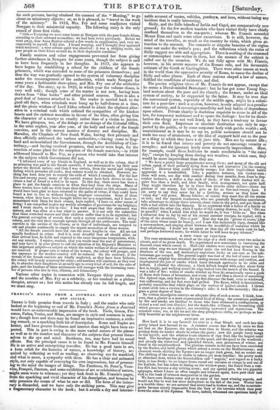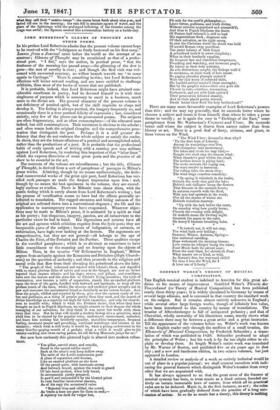FRANCIS'S NOTES FROM A JOURNAL KEPT IN ITALY AND SICILY.
THERE is little promise from travels in Italy ; and the reader who only looked at the beginning or end of Mr. Francis's Notes from a Journal would have an unfavourable impression of the book. Turin, Genoa, Flo- rence, Padua, Venice, and Milan, are meagre in style and common in mat- ter ; though here and there may be found an impressive sentence, a strik- ing remark, or a sparkling little bit of description. Rome and Naples are better, and have greater freshness and interest than might have been ex- pected. This in part is owing to the more varied nature of the places as well as to the number and character of the subjects that present them- selves to the eye and mind. Residence, too, may have had its usual effects. But the principal cause is to be found in Mr. Francis himself. He is an active and enterprising traveller. He has a good taste in art, a keen relish for the beauties of nature, a knowledge of history, ac- quired by reflecting as well as reading, an observing eye for mankind, and what is more, a sympathy with them. He has a clear and animated style, not only capable of conveying his own impressions, but of present- ing to the mind the images of things. The Pantheon, St. Peter's, Vesu- vius, Pompeii, Paestum, and some exhibitions of art or celebrities of nature, might seem worn to triteness; yet they look fresh in Mr. Francis's pages, from the sparkling and vivid character of his description, and because he only presents the cream of what he saw or did. The form of the intine- rary is discarded, and we have only the striking parts. This may give a fragmentary character to the book ; but it avoids a dry and intermi-
nable account of routes, vehicles, postboys, and inns, without losing any incident that is really interesting. Sicily, and the little islands of Ischia and Capri,-are comparatively new
ground; for the few modern tourists who have visited Sicily have chiefly confined themselves to the sea-ports ; whereas Mr. Francis ascended Mount Etna and made some other excursions. It is still, however, the mind of the traveller, as much as the country he visits, which gives at- traction to the account. The romantic or singular beauties of the region come out under the writer's pen ; and the reflections which the ruins of Sicily suggest are able and appropriate. There is nothing of the crammed or commonplace tour-writer in them, but the essence of the subject is called out by the occasion. We do not fully agree with Mr. Francis, however, in his severe censure of the Roman rule, and his favourable estimate of the Greek or Carthaginian. There were other causes at work in the world than the oppressive severity of Rome, to cause the decline of Sicily and other places. Each of those nations obeyed a law of nature, fulfilled the conditions of existence, and died.
The precise religious views of Mr. Francis do not appear, except that he seems a liberal-minded Protestant : but he has got some Young Eng- land notions about the poor and the church ; the former, under an ideal system of society, to be supported by the latter. It may be true that the conventual system, especially of the middle ages, might be a substi- tute for a poor-law : such a system, however, is only adapted to a peculiar state of society, and it encourages mendicity and lazy habits of dependence upon others. Private charity is doubtless requisite to come in aid of the law, for temporary assistance and to spare the feelings : but for its distri- bution the clergy are not well fitted, as they have a tendency to favour their own flock. Impotence or absolute destitution can only be sup- ported by the public, or by some corporate body with public wealth ; and, unsentimental as it may be to say so, public assistance should not be made too easy of attainment, or the idea of support held out to the poor as a thing to which they have a de jure title. Men are by nature idle ; it is to be feared that misery and poverty do not encourage veracity or scruples ; and the ignorant needy seem necessarily improvident. How, for example, could these Ischiotes be made comfortable in "the rainy day," except by keeping them during wet weather; in which case, they would be more improvident than they are. " We have a pretty large acquaintance among them; and many of the old and infirm speak of their probably dying from cold and starvation in the ensuing winter]. Distress they could scarcely escape; but their improvident habits aggravate it a hundredfold. Take a populous instance, the donkey-men : these will earn, one day with another during four months, from June to Sep- tember inclusive, a dollar a day each of them: of this their donkey will re- quire less than a tenth, and their family, with management, not quite half. They might therefore lay by in these four mouths sixty dollars—above ten guineas of our money, but which goes as far as five-and-twenty here. I am sorry to say they never lay by a farthing, serious as they know the rainy day' will prove. Misery tbllows: of course they must live all the winter on tick; and the roguish tradesmen, who are generally Neapolitan speculators, take advantage to charge them interest, cheat them in the price, and put them off with a had article into the bargain. In an argument with a father of a family on this subject the other day, when I spoke of the coming distress, he said, Die me ne gnardi I' when I asked him what he would do, it was Iddio sa.' But when I exhorted him to lay by out of his actual summer receipts, he replied, with a shrug of the shoulders, Non si puO: Next day was his •giorno di come,' (day of the saint whose name lie bears); and I saw him ludicrously tipsy, dressed like a merryandrew, and singing aloud between the mouthfuls of macaroni which he kept swallowing. I doubt not he spent on that day all the ready cash he had, and perhaps borrowed more; for which latter he will have to pay interest,"
A NEW VIEW OF VESUVIUS.
The cone surmounted, we stood on the edge of a dark crater some two miles in circuit, and of no great depth. We experienced new sensations in traversing the fissured crust which covers it. Half-cold cinders were crackling around us; at every .other step we saw through partial rents the red-hot lava flowing in the direction of the sea, and momentary explosions broke on our ears as the sub- terranean gas escaped. The general aspect was that of the bed of some vast fur- nace, where sulphur has streaked the cooling masses with orange and verditer, and impregnated the jets of smoke which burst through apertures in its sides and bottom. I climbed the chimney, a black hillock heaped with ashes about forty feet in height, and walking round its edge looked into the month of the funnel. It was a lake of fire: vollies of smoke whirled up front it; occasionally came a gush of flame with fumes of brimstone, and every now and then a shower of something like lighted rags, only heavier. At ten feet distance the heat, even to windward, was suffocating, and my feet were half grilled. The flame, which is intermittent, probably resembles that which plays on the surface of ignited alcohoL I thrust a stout stick into a crevice in the chimney's side: it took fire instantly; this ar- gues a great degree of heat. No written description conveys an adequate idea of such a scene. I think, how- ever, that a glacier 13 a more supernatural kind of thing: the sensations produced by fire and smoke are familiar to those who have witnessed a conflagration, or visited a coal and iron district; but the death-like stillness, the benumbing chill which possess you on a glacier, are something unwonted and mysterious. The streaked veins, too, in the ice and the deep precipitous clefts, ate perhaps as hor- ribly beautiful as the sulphureous lavas.
AUTUMN AT ISCUIA.
How hard it is to say farewell fur ever to a dear friend; and such has this pretty island now become to us. A summer season has flown by since we first set foot on the Epomeo: the myrtles were then in bloom, and the arbutus WAS putting forth its tender shoots to solace the goats: now the purple berry hangs on the myrtle and the arbutus bears clusters of ripe fruit like the largest coral bead. The becafique has given place to the quail, and the quail to the woodcock; and already the water-rail and spleckled thrush, sure precursors of winter, are found in the neighbourhood. The glorious sunsets in the sea have been succeeded by the flushes and lurid gleams which attend a storm on the Mediterranean; and chestnut woods skirting the Epomeo are no longer dark green, but an umber red. The shifting of the season is visible in tokens yet more familiar: the pretty moth so abundant here, which the householders call " angiolo," and regard as a lucky fairy, is less lively; be no longer hums round our curtains or creeps in and out of the keyhole, but has taken to dozing on the window-pane; the lizard from a rest- less flirt has become a shy retiring scout; and my special pets, the two gigantic sphynges, whom I have so often caught and released again, have paid their last visit to the bush of crimson marguerites in the garden. We have seen Nature come and go in some of her most winning aspftts, and would not like to wait her utter decrepitude in the fall of the year. Winter here is a terrible time: we are assured that every road is broken up, and the mountain- paths become utterly impassable from the fury of the torrents which then pour down the aides of the Epomeo. We have, indeed, witnessed one specimen lately of
what they call their " cattivo tempo": the storm burst forth about ninepin., and lasted till one in the morning; the rain fell in absolute spouts of water, and the glare of the lightnings with the prolonged bellowing of the thunder among the crags was awful; the Epomeo seemed like a tremendous battery on a battle-day.



























 Previous page
Previous page